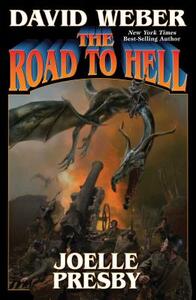Take a photo of a barcode or cover
The second book came out a year after the first, but the third book came out almost ten years after the second. That's a long time. It's been six years since the second book released, so it's anybody's guess when the next book would be. The series is clearly not anywhere near finished, so for those hoping for that, you'd be out of luck. Considering the author is sixty-eight as I'm writing this, it's entirely possible that the series won't ever be finished, but that doesn't matter to me overly much. The third book has a different co-author, but I didn't really notice much difference, though it's certainly questionable whether I would even if there was much difference. If there ever is a fourth book, I'll read it.
The third book is much more like the first book than the second, which was mildly disappointing. It's entirely focused again on war logistics, political maneuvering, and general day-to-day activities. In terms of action, not much happens until the last 20% or so. For me, the slowest part was the many consecutive pages describing the precise technical details of the military vehicles. Thankfully that was the sole infodump of it its kind.
The most amusing and interesting part of this for me exploring in detail what was hinted at in the previous book, which was that role that belief plays in terms of physical constants and universal mechanics in general. Hopefully it will be used to amusing effect in any potential future book.
Although they were included in the two previous books, the sentient animals play a larger role in this book and based on what occurs, will certainly have a larger role at later time. The two main sentient animal groups are cetaceans and simians. The portrayal of orcas as bloodthirsty warmongers who want to join the war effort to have a reason to eat humans again was certainly unexpected. The simians are also preparing for war in their own way as well.
At various points it seemed more like they would have preferred this to be straight up historical fiction rather than was it is, as there were various references to real world events and some of the actions they took seemed like they would more appropriate to the real world than this setting.
It continues to be the case that I have stylistic and aesthetics disagreements, but that's to be expected at this point, especially with some of the dialogue as it can be entirely too bombastic and tries to drive its point home with all the excessiveness of hammering in nails with a sledgehammer. I did a fair bit of eyerolling, especially with any dialogue involving women or traditional concepts, but it only mildly detracts overall.
Will I have forgotten a lot of it if there's another book? Yeah, probably, but it doesn't really matter, and I'm sure it'll work out just fine.
Rating: 4/5
The third book is much more like the first book than the second, which was mildly disappointing. It's entirely focused again on war logistics, political maneuvering, and general day-to-day activities. In terms of action, not much happens until the last 20% or so. For me, the slowest part was the many consecutive pages describing the precise technical details of the military vehicles. Thankfully that was the sole infodump of it its kind.
The most amusing and interesting part of this for me exploring in detail what was hinted at in the previous book, which was that role that belief plays in terms of physical constants and universal mechanics in general. Hopefully it will be used to amusing effect in any potential future book.
Although they were included in the two previous books, the sentient animals play a larger role in this book and based on what occurs, will certainly have a larger role at later time. The two main sentient animal groups are cetaceans and simians. The portrayal of orcas as bloodthirsty warmongers who want to join the war effort to have a reason to eat humans again was certainly unexpected. The simians are also preparing for war in their own way as well.
At various points it seemed more like they would have preferred this to be straight up historical fiction rather than was it is, as there were various references to real world events and some of the actions they took seemed like they would more appropriate to the real world than this setting.
It continues to be the case that I have stylistic and aesthetics disagreements, but that's to be expected at this point, especially with some of the dialogue as it can be entirely too bombastic and tries to drive its point home with all the excessiveness of hammering in nails with a sledgehammer. I did a fair bit of eyerolling, especially with any dialogue involving women or traditional concepts, but it only mildly detracts overall.
Will I have forgotten a lot of it if there's another book? Yeah, probably, but it doesn't really matter, and I'm sure it'll work out just fine.
Rating: 4/5
Third book in series after many years between books. I had trouble keeping the Army officers on one side of the conflict straight in my mind. Names too similar, all with honorific "chan". To be fair, it really wasn't necessary to keep them all straight.
Seemed a bit clumsy at the beginning - I suspect from the author change - but once it got going, it really got going well. Felt on balance by p50 or so.
adventurous
tense
medium-paced
Plot or Character Driven:
Plot
Strong character development:
Complicated
Loveable characters:
Complicated
Diverse cast of characters:
Yes
Flaws of characters a main focus:
Complicated
It's a good story, but the sheer number of characters and plot lines is overwhelming.
We waited 10 years for this? Weber's weaknesses as an author are on full display here, too much infodumping, not enough actually moving the plot, ridiculously over done foreshadowing, too many minor characters nobody gives a damn about but we're getting a full description of them anyhow (this may be one of the few times I agree with the common complaint about names) and surprised declarations of how important something is that will never be mentioned again in this book. I suppose it could count as a cliffhanger, if it didn't happen halfway through the book. There are some good points, Weber still writes an excellent action scene (this book just needed a few more of them) and does a pretty good job with good people who are stuck on the wrong side (the actual villains are cardboard though).
Not a terrible read, but not something I'd recommend to anyone who isn't a pretty hardcore Weber fan.
Not a terrible read, but not something I'd recommend to anyone who isn't a pretty hardcore Weber fan.
I like the magic versus technology theme but the heroes and villains are so black and white. It also ends on a cliffhanger which given the last book was written nine years ago, is annoying. You must read the previous books, it cannot be read as a standalone.



